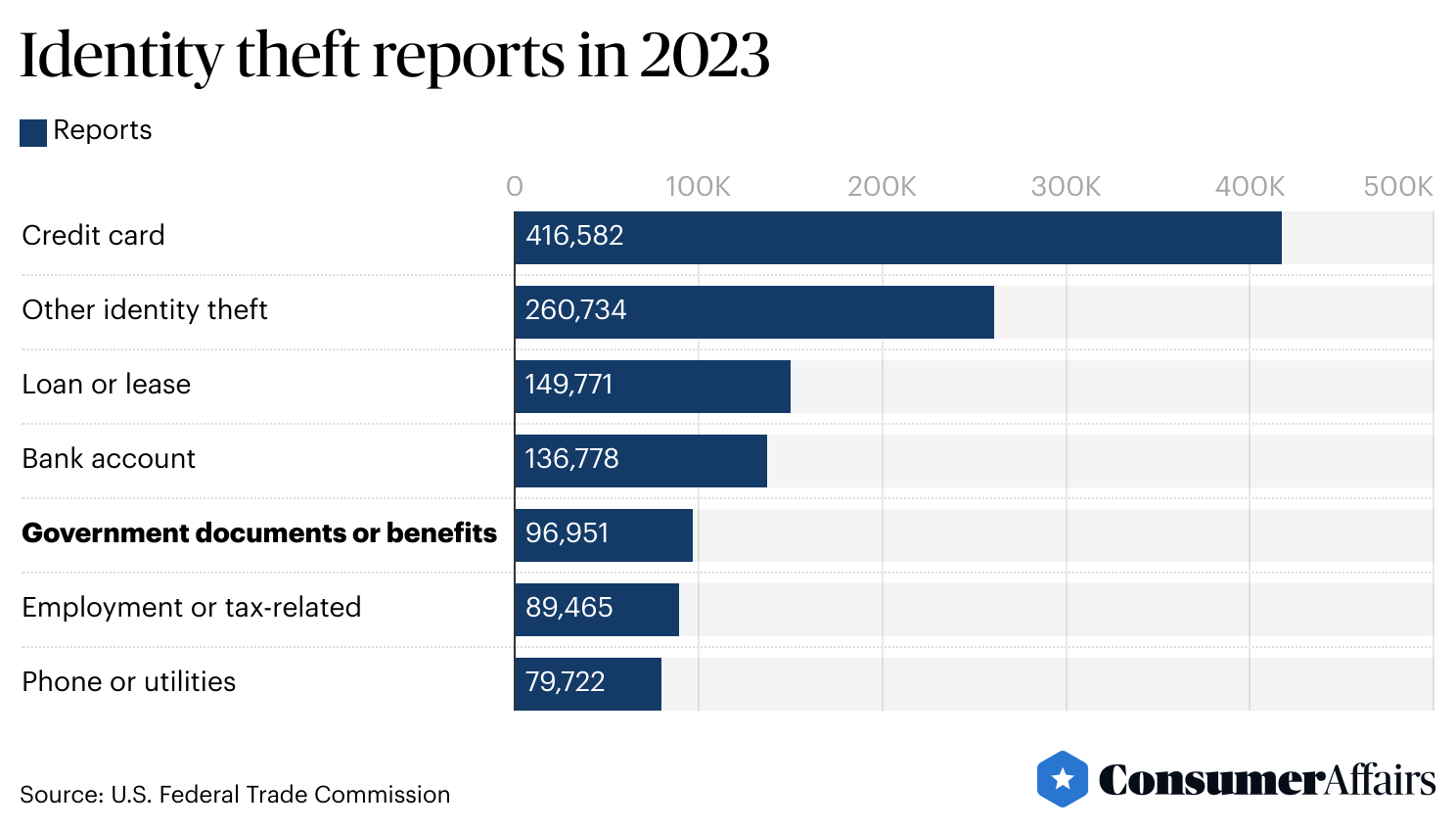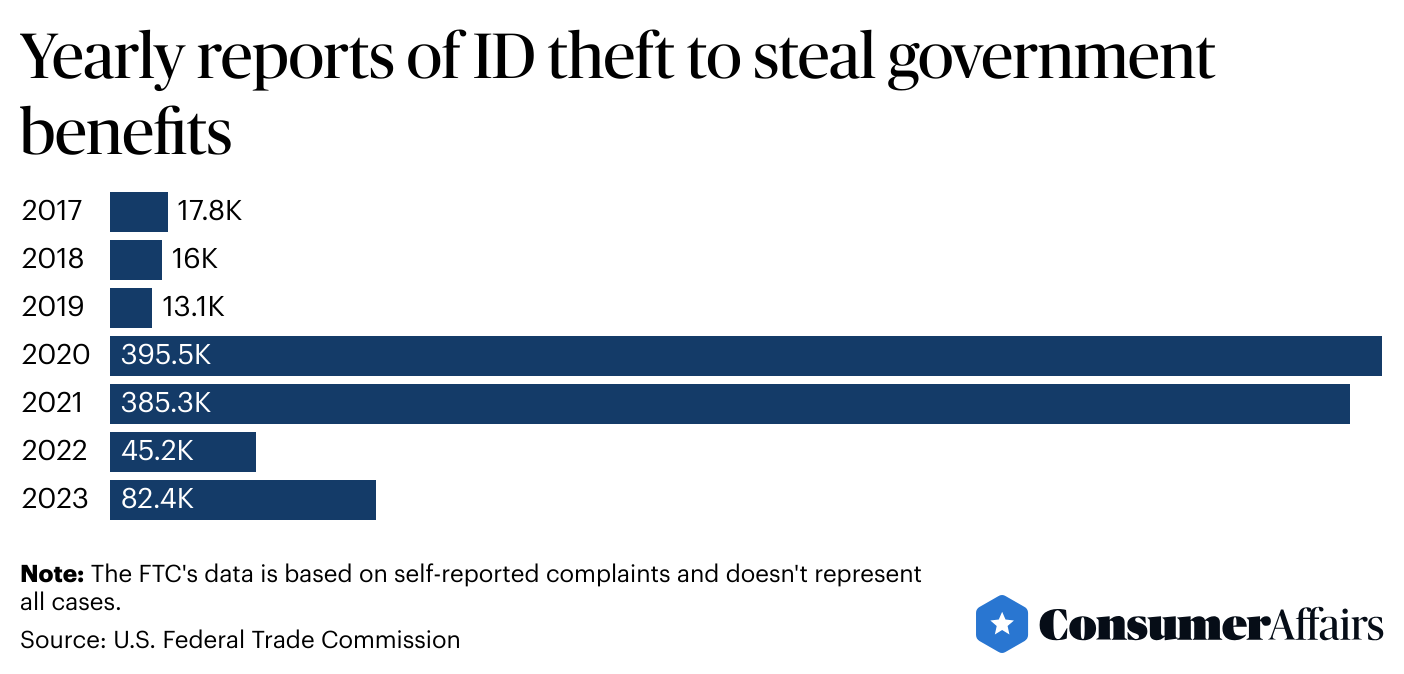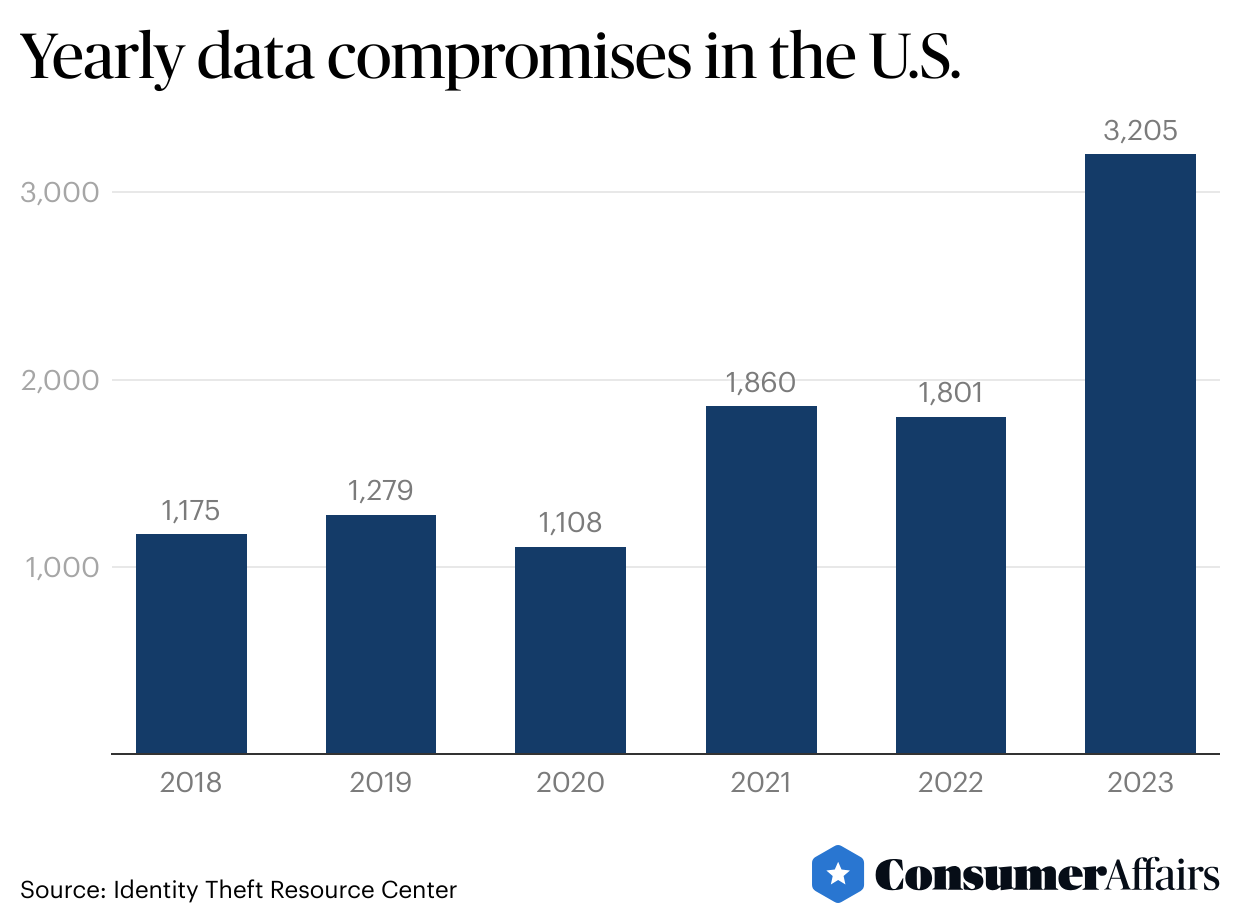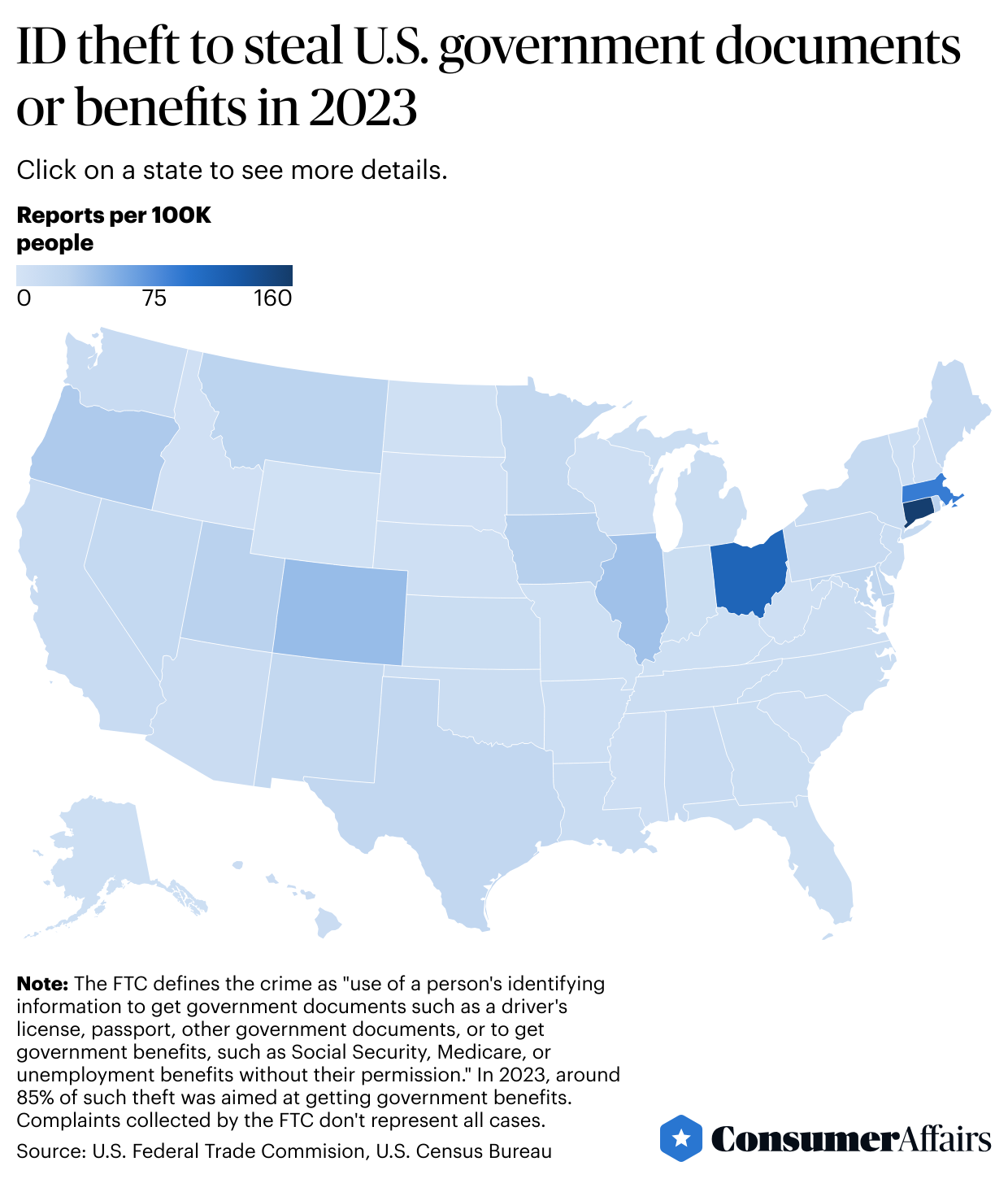Scams stealing government benefits like unemployment checks have jumped 82%: Here's how to protect yourself

Canva
Scams stealing government benefits like unemployment checks have jumped 82%: Here’s how to protect yourself
U.S. Treasury check, social security card and hundred dollar bills displayed on tabletop as concept of elements of ID theft scams.
Scammers are stealing more identities to pilfer government benefits, riding a wave of fraud that rose to new heights during the pandemic and still remains a stubborn problem.
Identity theft to receive government benefits — typically unemployment insurance — shot up 82% in 2023, according to a ConsumerAffairs analysis of Federal Trade Commission data, topping 82,000 reports last year.
These scams can go undetected for months, and the victims may not even be aware of the theft until they try to access government benefits themselves. Victims report struggling to get unemployment insurance after being laid off, with some waiting months for a resolution from the state.
Complaints about government benefit theft rose as layoffs soared in 2023, nearly doubling in job cuts from 2022, according to outplacement firm Challenger, Gray & Christmas. The firm said earlier this year that U.S.-based employers recorded the second-highest number of planned job cuts for the month of January since 2009.
The FTC collects self-reported complaints on identity theft of state and federal benefits from various sources, including government agencies, but these reports are believed to cover only a fraction of all identity theft in the United States.
“It is most likely the tip of the iceberg,” said Megan Cox, an attorney in the FTC’s Bureau of Consumer Protection.
Identity theft for government benefits jumped, while overall identity theft fell around 6% in 2023. The FTC tracks seven types of identity theft, including for credit cards, bank accounts and loans or leases.
Stealing government benefits accounted for around 85% of identity theft in the FTC’s “government documents or benefits” category. Other scams falling in that category include using identities to obtain driver’s licenses, passports or other forged government documents.
![]()

ConsumerAffairs
Government benefit identity theft moves into fifth place
A graph chart showing results to identity theft reports in 2023.
In 2023, government benefit identity theft ranked fifth nationally among the seven identity theft types the agency tracks. In 2022, it ranked last place after plummeting from sky-high levels during the pandemic, when scammers stole more than $100 billion in unemployment insurance. Still, the theft shows no signs of going away.

ConsumerAffairs
Higher incidents of government benefit unlikely to subside
A graph chart showing results to Yearly Reports of ID Theft to Steal Government Benefits.
“Even though it has fallen pretty dramatically from that peak, we’re at this new elevated baseline,” said Eva Velasquez, president and chief executive of the Identity Theft Resource Center, a nonprofit that helps victims and researches the issue. “This elevated baseline is going to be here to stay for a while.”
Stealing unemployment and other benefits has risen because state governments removed in-person requirements during the pandemic, experts say, and even after pandemic funds ended, scammers kept at it because there’s still plenty of money to tap.
“When that sunset, I think a lot of people misguidedly thought this will make them go away because they are not making as much money,” Velasquez said.

ConsumerAffairs
Incidences of US data breaches climb
Yearly Data Compromises in the U.S.
Data breaches are adding to the problem. There were a record 3,205 data compromises in 2023, versus 1,801 in 2022, according to the Identity Theft Resource Center. However, the nonprofit says the number of yearly victims is falling because scammers are going after specific information instead of mass attacks.
“I do not believe that there is any adult in the U.S. who has not had their Social Security number compromised multiple times,” Velasquez said. “Your data is in the wild.”
What government benefits are getting stolen?
By far, unemployment insurance is the most commonly stolen government benefit. In 2023, unemployment insurance accounted for 54% of identity theft at state agencies, followed by food stamps at 11%, according to figures provided to ConsumerAffairs on victims who contacted the Identity Theft Resource Center.
Matthew Loker, an attorney specializing in identity theft based in Arroyo Grande, California, said it was rare to hear about unemployment identity theft before the pandemic, but now there are a handful of people reaching out every week.
“Now it’s just rampant,” Loker said. He said scammers are going after unemployment because it can pay out for months, unlike credit cards or bank accounts, which are usually one-offs.
“The ‘nice thing’ about the unemployment benefits is that it is a steady stream of income,” he said. “They are getting that check every single month.” Worse, victims of this kind of identity theft often find out too late and have to wait months for a resolution from the state.
“The issue with unemployment benefits fraud is that consumers aren’t getting notice whatsover,” he said. “Then they go to apply and they receive notice from the state saying, ‘Well, you’re already receiving benefits so we can’t give you more.'”

ConsumerAffairs
Where identity theft for government benefits is happening
A states heatmap showing reports of ID Theft to Steal U.S. Government Documents or Benefits in 2023.
Identity theft aimed at stealing government documents or benefits is happening more frequently in some states, such as Connecticut, Ohio and Massachusetts, according to the FTC. However, identity theft experts caution that state-level reports may be inflated depending on how easy or how likely it is for people to complain, and how easy it is to apply for government benefits.
How are scammers stealing identities for government benefits?
The top way the scam starts is with a phone call, the FTC’s Cox said. Those calls can even come from caller IDs pretending to be from a trusted service like your bank that urgently needs information.
“Scammers like to make the situation so immediate that you can’t stop to check it out,” Cox said, adding that you should be cautious if someone claims to be from the government.
“Government impersonators can create a sense of urgent fear, telling consumers to send money right away or provide their Social Security number to avoid arrest or some other trouble,” she said. “Or they can play the good guy, promising to help a consumer get some free benefit like a grant or prize.”
One common method is phishing emails or text messages that pretend to be from government agencies, said Alex Kaluza, a research analyst at the industry group Cloud Security Alliance. Others include fake government websites that harvest your information and malicious software that lands on your device to steal information. In some cases, Kaluza said, scammers carry out “synthetic identity theft,” where they create fictitious identities with a mix of real and made-up information to apply for government benefits.
And unfortunately, identifying information is often already out there, and scammers can simply purchase what they need on the dark web.
What are governments doing about identity theft?
Loker, the identity theft lawyer, said one reason scammers are targeting unemployment is that the systems states use are behind the times, including computers dating back to the 1980s.
In an effort to modernize and in response to unemployment claims during the pandemic, more than two dozen states have adopted ID.me, a private company that verifies identities through facial recognition, document scanning, multifactor authentication and other means.
With ID.me, which in January said it reached 50 million identities verified to a federal standard, users can access their unemployment benefits and also other federal services such as the IRS and Social Security. However, ID.me has faced criticism for errors in its facial recognition technology and for improperly storing people’s biometric data.
In response, an ID.me spokesperson said it uses the best-in-class face-matching technology on the market, achieving more than 99.3% accuracy, and follows widely accepted standards for managing personal data.
In a recently concluded testing period with Iowa, which in 2023 ranked No. 7 in the nation for identity theft aimed at government documents or benefits, ID.me said it helped halt more than 1,200 scam attempts since January.
Velasquez of the Identity Theft Resource Center said that further use of biometrics, such as fingerprints and facial verification, would significantly reduce identity theft for government benefits.
“I know it gives people the total creepy factor, but a lot of people use their fingerprint or face to unlock their phone,” she said.
How can you protect yourself?
Compared with financial identity theft, where you can take steps such as freezing your credit, there aren’t as many options to prevent having your identity stolen to nab government benefits, Velasquez said.
“They are few and far between,” she said. Even so, the FTC and identity theft experts have recommendations you can follow.
- Create strong passwords: Make different passwords for different accounts that use a mix of characters.
- Don’t give out information: If someone calls, emails or texts asking for identifying information, say you need to look it up first and will get back to them. Stop and ask yourself, “Why do they need this information?” The fewer people who have your information, the more protection you’ll have.
- Check who they are: Find out if they’re representing what they claim by contacting the relevant group, such as your bank and utility. Be on guard for people who say they are with the government, including the FTC, the FBI or the IRS.
- Don’t click on links: Avoid clicking on links sent via email or text from senders you don’t recognize. Even if the sender appears to be from a phone number or email you recognize, don’t click; instead, log in to the relevant service through its online portal. Contact the purported sender independently to see if the request is real.
- Add multifactor authentication: Establish an extra layer of security with multifactor authentication for online services with sensitive information, including email, banking and tax preparation. This will require two or more credentials to log in into an account, such as both your password and a one-time code texted to your phone.
- Don’t share on public Wi-Fi: Avoid sharing sensitive information over public Wi-Fi networks, and check to see if the website is secure by using “HTTPS” in the URL.
- Get an IRS pin: Everyone can get an Identity Protection Pin from the IRS, which is a six-digit number that prevents people from using your Social Security number or individual taxpayer identification number to file taxes.
What should you do if your ID is stolen for government benefits?
1. Get help: Go to IdentityTheft.gov, report your situation, and get a recovery plan. You can also call the Identity Theft Resource Center at 888-400-5530 to get advice.
2. Gather documentation: Collect any proof that shows your identity is being used and where it is happening, such as letters of denial from the program you were applying to and notes on phone conversations.
3. Contact the government: With your documentation in hand, contact the relevant government agency. If it is happening in multiple states, you have to file a fraud report with each state where it is happening.
4. Consider lawyers: There may be out-of-pocket costs, but sometimes attorneys will take cases for little to no charge, depending on the consumer protection laws in the state. Still, Velasquez said to only get an attorney involved if you aren’t making progress.
“The onus really is on victims, unfortunately,” Velasquez said.
This story was produced by ConsumerAffairs and reviewed and distributed by Stacker Media.